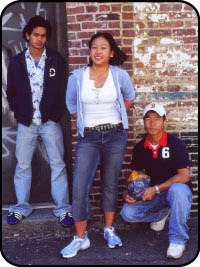
DocuClub: Show Me the Footage
Written by Ellen Mills | Posted by: Anonymous
The advent of lightweight cameras, digital video and desktop editing systems has been a boon to filmmakers, especially documentarians, because the equipment allows them to shoot solo and "on the fly." The downside to these innovations is that documentary filmmaking can be a lonely pursuit. Filmmakers toiling alone in an editing room become so familiar with their footage or so attached to certain parts of it that they lack perspective on the work and need fresh opinions. Enter the DocuClub, where any filmmaker who is a member can apply to have their film shown to other members, mostly working filmmakers themselves, and receive their creative input and support.
According to Liz Ogilvie, Program Manager of the DocuClub, they offer two programs for screening works-in-progress. The first program is called In The Works and is for feature-length documentaries. Each month there is an application deadline for the following month’s screening date.
"The filmmaker submits a VHS tape and the Screening Committee of working filmmakers views it, along with the DocuClub staff," Ogilvie explains. "Then, based on everyone’s comments we select the film." The chosen film is screened before an audience and the discussion is facilitated by an editor/filmmaker. Ogilivie says that the atmosphere is friendly with an emphasis on helping the filmmaker and offering encouragement. Afterwards there’s a reception where the crowd does some networking. "You can have a glass of wine and share your war story," says Ogilvie.
In keeping with the community spirit of the club, no work is ever rejected. If the club is unable to offer a full screening to a filmmaker they offer the chance for a one-on-one critique given by a veteran filmmaker who volunteers to view the film and offer advice through a program called the Home Screening Program.
The second program is called Idea Workshop and its aim is to help people perfect their "pitch" to film industry executives and potential donors and investors. "You need to have that one line to say when someone asks, ‘what’s the film about?’" says Ogilivie. She explains that three pre-selected filmmakers bring trailers of their film, show them to a panel of industry executives and then pitch the film. The content and delivery of the presentation is critiqued and the filmmaker gets some valuable experience, contacts and advice.
DocuClub member Lina Matta screened a film she made with Odile Isralson called "Prison Lullabies" at In the Works, and raves about the experience. "It was great," she says. "We’d been editing for about 11 months and there was an issue with a certain part of the film. Part of it was working well and part of it was problematic." Matta says that sitting in the editing room and watching the footage on the Avid screen had its limits. "After 11 months, you don’t really see it anymore. Certain things you just want to think are solved."
The film is about an innovative program that allows pregnant women who are incarcerated to keep their babies and care for them in prison. The first third of the film had to convey a great deal of information including introducing the program and the women who are participating and who will be followed throughout the film. In addition, events unfold at the prison during this time that needed to be shown.
Before the screening, the filmmakers made some editing decisions. "We stopped trying to say everything about the prison system," Matta says, "And the reaction from the audience was that it worked. That’s what came from DocuClub."
For Matta and Isralson, seeing the film on the big screen was a revelation in itself. "There’s nothing like seeing all your mistakes on the big screen," she laughs, "Twenty times bigger than in the editing room. Also, hearing the audience — where they laughed and where they fidgeted — that was invaluable." Matta says.
Although the potential is apparent at these screenings for awkwardness, defensiveness or plain old jitters, Matta says that the "atmosphere is super-relaxed. Liz is very good at putting everyone at ease. Afterward, everyone is very approachable — from all experience levels."
When "Prison Lullabies" was finished it returned to the DocuClub as part of the Completed Works program where it received a theatrical screening before an audience who paid for their tickets. "That was exciting," Matta says. Many of the audience members from the first screening returned to see the finished film and told Matta and Isralson that they thought the film was much better. Since its DocuClub screenings "Prison Lullabies" has shown at 11 film festivals and received four awards.
The DocuClub was formed in 1995 by filmmaker Susan Kaplan who, as Ogilivie explains, "was and is a working filmmaker who saw so many people needing feedback from their peers." According to the group’s website (www.DocuClub.org) the mailing list grew rapidly through word-of-mouth to more than 3,500 people. The club is located in Manhattan and primarily serves members who live in the five boroughs of New York City. However, membership is open to anyone who completes the membership application on the website and pays an annual fee of $40. Members have access to many online resources including a database for information, employment and a monthly newsletter of programs.
New England filmmakers are welcome to join and submit films for consideration in the monthly screenings, but must be willing to pay their own way to New York City to attend. Another option for New Englanders is participation in the In the Works Festivals, which is a traveling version of the In the Works screening that is taken to regional film festivals. Boston based filmmaker Julie Mallozzi had her film, "A Name For Our Family" accepted by the DocuClub for a rough cut screening in Newport, Rhode Island in conjunction with the Newport Film Festival. She came away from the experience with lots of good ideas for the fine cut of her film and a great impression of the DocuClub and their work. " [The screening] was incredibly helpful in many ways — one way was that it gave me a deadline for the rough-cut. I got so much done in the month before the screening."
Mallozzi describes her film as a "coming of age story about three Cambodian teenagers in Lowell, Massachusetts." The teens are involved in a traditional dance troupe while "trying to make good on their parent’s dreams for them in this country" and navigating through the temptations and choices that face them each day. Mallozzi says that in editing her film she often felt that there was more than one story, and that she chose one story to tell during that final month of work before the screening.
"I’ve arranged rough-cut screenings before for myself and others with a handful of people, usually friends and colleagues. But it was very different to be in front of a room full of strangers," Mallozzi says. She contends that she was more excited than nervous to get the feedback about her work. The audience of filmmakers and documentary fans provided her with valuable perspective and insight.
"Part of it was very reassuring that the basic story worked for people," she says. "I cut out a whole film about the dance troupe, so I wondered how much dance to use." The audience’s reply was "dance is huge" so Mallozzi, whose film now has the title "A Name for Our Family" (formerly "Monkey Dance") has returned that element to the film as a constant theme in the lives of the subjects.
As for the screening itself, Mallozzi has nothing but praise, "Everything was incredibly professional. They rented a Beta SP deck, where someone else would’ve gotten a VHS or a DV. Plus they brought in technicians, a sound system and the room of course. There was a moderator, [well-known Cambridge filmmaker] Rob Moss. Also it was publicized as if it was a festival screening. They even made an audiotape for me to listen to later and they put me up in a hotel."
In the end, she says, "They made me feel like I was doing them a big favor and I felt like they were doing me the favor."
Ogilvie says the club is working to help start similar DocuClub groups in other regions and also to expand the In the Works Festivals. Film is often referred to as "the collaborative art" and the DocuClub proves that even with the advances of technology which allow for more do-it-yourself media creation, there is no substitute for conversation with one’s peers or constructive criticism from respected colleagues.
To learn more about the DocuClub, including future submission deadlines and screenings: www.DocuClub.org or (212) 582-3055. The next In The Works screening is Dec. 11. The next Idea Workshop is Jan. 7. For information about Lina Matta and Odile Isralson’s film, visit www.prisonlullabies.com. For information about Julie Mallozzi, including her film 'A Name For Our Family,' visit www.juliemallozzi.com.











